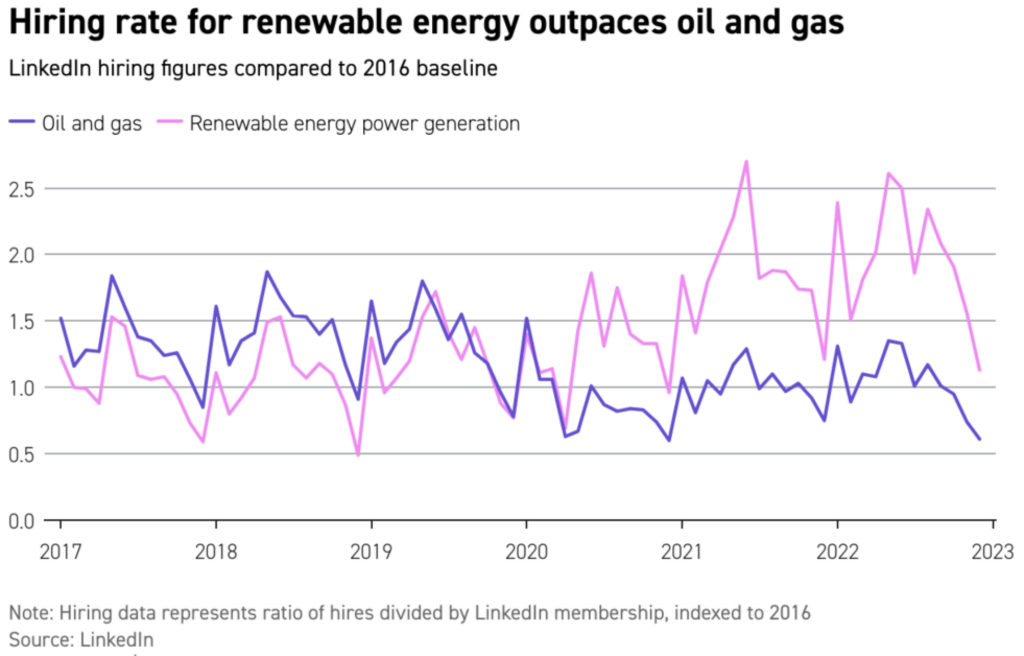Menu
Just Transition Insights, Issue #18, 06/26/2023
By Jonathan Tasini
|

[Editorial note: We will be publishing on a monthly basis during the U.S. summer months and will return to our regular schedule in September]
Leading Off: Making EVs Work For American Workers
We were stuck by the news last week of a massive loan extended by the U.S. government to Ford to set-up three battery plants (and we feature today in our Opinion section a reaction to the news from Shawn Fain, president of the U.S. United Auto Workers union):
Ford Motor and its battery manufacturing partner will receive a $9.2 billion loan to build three battery factories in Kentucky and Tennessee, the Department of Energy said Thursday. The loan is the single biggest financial commitment the Biden administration has made in its effort to build an electric vehicle manufacturing network in the United States.
The loan will go to a joint venture created by Ford and its partner SK On called BlueOval SK, which will supply batteries for electric Ford and Lincoln cars and trucks. The factories, one in Tennessee and two in Kentucky, will employ 7,500 people and are among the largest such plants being built by auto and battery companies across the country, especially in Southern states. They are scheduled to begin production in 2025.
We can say the following with confidence: the loan will finance the setting up of non-union factories. That is a deliberate strategy on the part of Ford and its joint venture when it explicitly plans to site the plants in the non-union, lower wage South.
A better way to envision the future of workers in the electric vehicle industry has been sketched out by the UAW going back to at least 2021, a path that is quite different from the Ford loan:
What will these changes mean for workers? The growth of EVs must be an opportunity to re-invest in American manufacturing, with union workers making the vehicles of the future. But, to make sure this disruption does not leave American autoworkers behind, government subsidies and tax breaks for the transition to new technology must be paired with a commitment to locate these jobs in the United States at comparable wages and benefits to the jobs they replace. And we must ensure our laws level the playing field and give workers a voice on the job, which is why we are calling on Congress strengthen our labor laws and pass the PRO Act. Protecting jobs and wages during this transition will only happen if workers have a seat at the table. Which is why the UAW is using the power of a union – through collective bargaining, organizing, and political advocacy – to demand high-quality manufacturing jobs as the industry changes.
And:
To make EVs work for American workers, we need policies that promote domestic manufacturing and
quality union jobs:
-
Technologies developed in the U.S. must be manufactured in the U.S.
-
Consumer incentives need to promote domestically manufactured vehicles made by union workers.
-
Manufacturing incentives and subsidies must require companies to live up to their promises and return taxpayer dollars if they do not provide quality jobs and freedom of association.
-
Pro-worker trade and tax policies should stop the race-to-the-bottom and promote the production of advanced technologies here in the U.S.
-
Labor laws must provide a level playing field and give workers a voice on the job, which is why we are calling on Congress to pass the PRO Act.
-
Public procurement at the local, state, and federal level should include strong standards to promote domestic manufacturing and union jobs.
-
Vehicle efficiency improvements cannot be a one-size-fits-all solution. Policies should provide sufficient flexibility and avoid unrealistic mandates.
-
National industrial policy is needed to ensure the jobs of the future are in the United States.
Alas, the Ford loan is a giant step in the wrong direction.
SPONSOR MESSAGE
A message from the Australian Mining And Energy Union
We are fighting back, not just for ourselves but for the future generation of mineworkers. Workers deserve better. Our families and communities deserve better. Visit us

Spotlight: Oz Skills Training Movement
In general, over the many decades, programs to retrain or “up-skill” workers have mostly failed. Either the programs have been vastly underfunded and/or workers have been trained in jobs that don’t exist or offer substandard worse wages and benefits.
Just recently, the Australian Minister for Skills and Training Brendan O’Connor announced the establishment of three new skills councils: the Manufacturing Industry Skills Alliance to hone in on modern manufacturing and associated industries; Industry Skills Australia will have a focus on the country’s core supply chain sectors; and the Mining and Automotive Skills Alliance to fill gaps in industries “critical to Australia’s economic and environmental future and net zero ambitions.”
The principle reason to hope that these councils will meet a “high bar” Just Transition standard is to view their creation in context: as we discussed in May, the Labor Government is forging ahead with plans to set up a statutory authority to meet its Net Zero targets, with a strong focus on workers and the transition into new jobs. Indeed, in the official announcement of the agency created to lay the foundation for the Authority, the Government said the Authority will:
Support workers in emissions-intensive sectors to access new employment, skills and support as the net zero transformation continues.
To be sure, the details are still being worked out. Our only point today is that skills training as a whisper of a chance to succeed if, and only if, it is part of a broad national policy to ensure real wages and benefits for workers.
Ideas: LinkedIn Is Not A Solution For Workers
We took notice of this:
“The increase in demand for green skills is outpacing the increase in supply, raising the prospect of an imminent green skills shortage,” LinkedIn said. “This supply-demand disconnect is likely to rise considerably without significant workforce investments – particularly in sectors like finance, manufacturing, and renewable energy – as policies designed to curb climate change are introduced and rolled out in countries around the world.”
And the data:

But, we note that this is precisely the problem facing workers who desire a “high bar” Just Transition. “Hiring rates” reported by various sources do not tell workers much about what to expect when it comes to a decent paycheck. In fact, what we know today is that the vast majority of the so-called “green skills” jobs are found in non-union companies—and, thus, simply by the reality of any metric of union vs. non-union work, we know the trend will be decidedly downwards when it comes to future jobs in so-called “green” industries.
Idea for LinkedIn and other such producers of data: tell workers what wages and benefits to actually expect when they consider applying for a “green skills” job.

Opinion: No Strings Attached To Ford Deal?
By Shawn Fain
[In reaction to a decision by the U.S. government to grant a $9.2 billion loan to Ford Motor Co., Shawn Fain expressed the following view]
We have been absolutely clear that the switch to electric engine jobs, battery production and other EV manufacturing cannot become a race to the bottom. Not only is the federal government not using its power to turn the tide – they’re actively funding the race to the bottom with billions in public money.
These companies are extremely profitable and will continue to make money hand over fist whether they’re selling combustion engines or EVs. Yet the workers get a smaller and smaller piece of the pie. Why is Joe Biden’s administration facilitating this corporate greed with taxpayer money?
In the past five years, workers who build GM products in Lordstown, Ohio, have had their lives turned upside down as they were forced to retire, quit or uproot their families and move all over the United States when GM closed their plants despite massive profits. Their jobs were replaced in GM’s new joint-venture battery facility with jobs that pay half of what workers made at the previous Lordstown plant. Not only is the White House refusing to right this wrong, they’re giving Ford $9.2 billion to create the same low-road jobs in Kentucky and Tennessee.
The last time the federal government gave the Big Three billions of dollars, the companies did the exact same thing: slash wages, cut jobs, and undermine the industry that for generations created the best jobs for working families in this country. Autoworkers and our families took the hit in 2009 in the name of saving the industry. We were never made whole, and it’s an absolute shame to see another Democratic administration doubling down on a taxpayer-funded corporate giveaway.
Fain is the president of the U.S. United Auto Workers.
Links
PETROL-İŞ (Petroleum, Chemical and Rubber Workers’ Union of Turkey): represents workers in the oil, chemical and rubber industries in Turkey
Table of Contents
Leading Off
Making EVs Work For American Workers
Spotlight
Oz Skills Training Movement
Ideas
LinkedIn Is Not A Solution For Workers
Opinion
No Strings Attached To Ford Deal?
Links
This Week's Links
Can’t wait to subscribe to the newsletter?
*We post information pursuant to the U.S. Fair Use Doctrine, and applicable international standards, in order to advance the knowledge base and education of our global audience. We endeavor to include the original link to documents. However, upon requests of original authors of posted documents, where explicit use permission is not granted, we will remove documents if it is determined continued use is not appropriate. We also reserve the full right to not include, or remove, any data inconsistent with our mission.















